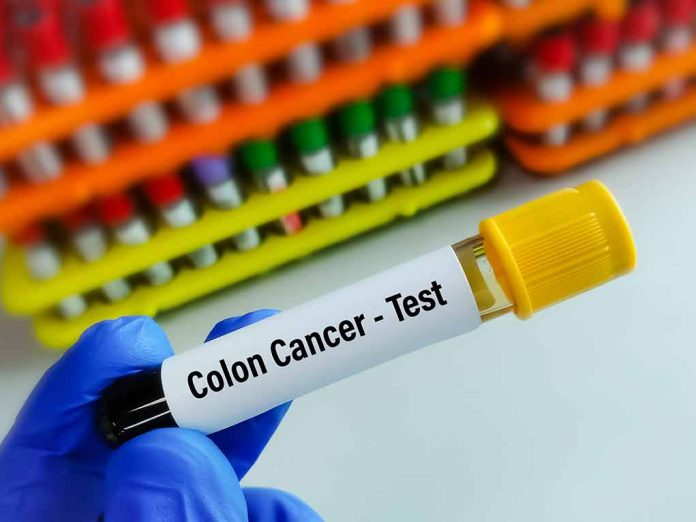
Daily consumption of processed meats like bacon and hot dogs increases colorectal cancer risk by 18%, with experts now warning that even younger people are developing this deadly disease at alarming rates.
At a Glance
- Consuming just 50 grams of processed meat daily (about one hot dog) raises colorectal cancer risk by 18%
- The World Health Organization classifies processed meat as a Group 1 carcinogen – the same category as tobacco
- New research suggests 8,500 bowel cancer deaths annually could be prevented by eliminating processed meats
- Colorectal cancer screening guidelines now recommend starting at age 45 due to rising cases in younger adults
- Reducing processed meat intake is one of the most effective dietary changes for cancer prevention
The Rising Threat of Colorectal Cancer in Younger Adults
Colorectal cancer, once considered primarily a disease of older adults, is now increasingly affecting younger populations. Medical professionals are witnessing this disturbing shift firsthand. “Just this week and last week, we saw patients as young as 16 years old [being diagnosed with colorectal cancer],” says Pashtoon Kasi, M.D. at Weill Cornell Medicine. This alarming trend has prompted health authorities to lower the recommended age for colorectal cancer screening from 50 to 45 years.
Colorectal cancer represents the third most common cancer diagnosis in the United States and the second leading cause of cancer-related deaths. With approximately 153,000 new cases expected in 2023, understanding the modifiable risk factors has become increasingly important for public health. Diet, particularly processed meat consumption, stands out as one of the most significant controllable risk factors.
✅Milk consumption is associated with a lower risk of colorectal, colon and rectal cancers
(Nature Communications, 8 Jan, 2025)
➡️The beneficial effects of milk (and other dairy products) were related to calcium.
✅Dietary calcium intake of 300 mg/day was associated with 17%… pic.twitter.com/r9SMvN4Iz9— Dr Sudhir Kumar MD DM (@hyderabaddoctor) January 11, 2025
What Makes Processed Meats So Dangerous?
“Processed meat is defined as meat preserved by smoking, curing or salting, or addition of chemical preservatives,” explains Hannah Dalpiaz, RD, LPN at Eatingwell. This category includes popular items like bacon, sausage, hot dogs, ham, deli meats, and beef jerky. Unlike fresh meats, these products undergo preservation processes that introduce potentially harmful compounds into the food. The preservation methods themselves create substances that may damage cellular DNA and promote cancer development.
The science behind processed meat’s carcinogenic properties is well-established. “Smoking produces polycyclic aromatic hydrocarbons when fat drips onto hot surfaces, creating smoke that coats the meat. Curing with sodium nitrite or nitrate converts into N-nitroso compounds during digestion, which are potent carcinogens,” explains Najeeb Al Hallak, M.D., M.S. at Augusta University Cancer Center. Additionally, the high heme iron content in processed red meats can damage the intestinal lining and promote inflammation.
“Research shows that eating processed meats like bacon and cold cuts can increase your chances for stomach and colorectal cancer.” – Lindsey Wohlford at MD Anderson Cancer Center
The evidence against processed meats is so compelling that in 2015, the World Health Organization classified them as Group 1 carcinogens—the same category as tobacco smoking and asbestos. This classification was based on substantial scientific evidence showing a causal relationship between processed meat consumption and colorectal cancer development.
The latest research shows that eating more than 12 to 18 ounces of red meat per week increases the risk of colorectal cancer. https://t.co/Bm19H0xP5P pic.twitter.com/za2qiW9f4L
— American Institute for Cancer Research (@aicrtweets) May 19, 2019
The Substantial Impact on Public Health
The relationship between processed meat and cancer is not just statistically significant—it has profound public health implications. A recent study indicates that nearly 220,000 cases of bowel cancer could be prevented between 2020 and 2050 if processed meat were completely removed from diets. Furthermore, researchers estimate that approximately 8,500 bowel cancer deaths annually could be prevented by eliminating processed meat consumption.
“If you eat red meat, the American Institute for Cancer Research recommends limiting the amount you eat to no more than 18 ounces/week, or about the size of two softballs.” – American Institute for Cancer Research at Prevent Cancer Foundation
Multiple meta-analyses show a consistent association between processed meat intake and colorectal cancer risk, with processed meat posing a significantly higher risk than fresh red meat. Studies indicate that individuals who consume high amounts of processed meats have a 20-50% higher risk of developing colorectal cancer compared to those who don’t eat these products. Research also suggests that each 50-gram daily portion of processed meat (equivalent to about two slices of bacon) increases colorectal cancer risk by approximately 18%.
Healthier Alternatives and Practical Recommendations
The consensus among cancer prevention experts is clear: reducing or eliminating processed meat consumption is one of the most effective dietary changes for reducing cancer risk. Instead of processed meats, health professionals recommend increasing intake of plant proteins like beans, lentils, and tofu. For those who enjoy meat, fresh poultry, fish, and limited amounts of unprocessed red meat are better alternatives.
“Yeah, so that’s quite alarming. Colon cancer is the third most common cancer in this country. Second cancer causing death in the United States. So there’s a lot of room for education, get the information out. So early prevention saves lives. So it’s important that we get the word out so that we can protect our loved ones.” – Dr. Christine Lee at Cleveland Clinic
Beyond dietary changes, other preventative measures include maintaining a healthy weight, exercising regularly, limiting alcohol consumption, and getting regular colorectal cancer screenings beginning at age 45 (or earlier for those with family history or other risk factors). Small changes, like replacing deli meat sandwiches with grilled chicken or hummus, can make a significant difference in long-term cancer risk while still providing satisfying meal options.



